---------------------------------------------------------
Domesticated ducks don’t have many natural defenses against predators. It is important to take steps to keep your ducks safe. In the wild, ducks rely mainly on flight to escape hungry predators. They will not resort to fighting unless cornered (and they won’t stand a chance fighting most predators). Domestic duck breeds are too large to support flying more than a few feet off the ground. A duck’s body is not built for land speed. Those flappy feet and short legs might be awesome at swimming but are wobbly and slow on land (unless you are chasing them to give them medicine then they suddenly become Olympic track stars).
It’s best to employ multiple predator proofing tactics to keep your flock safe from predators. Pick the best combo for your yard and situation to make the safest possible environment.
Secure Run
You should have a secure run that is at least 15-20 square feet per duck. Having a “secure” run means that you have a solid roof to protect from aerial predators, hardware cloth wire walls, and wire buried two feet down around the perimeter to discourage digging predators. This is the safest set up for your duck flock and if you keep your ducks in the run 100% of the time you will likely never lose one to a predator. Many people allow their ducks to free range in the yard. It comes with risks but it does make your ducks happy, and allows them to forage and get plenty of exercise. click here to read more about free ranging.
Even if you plan to free-range your flock, you should still have a run where they can be outside when free-ranging isn’t possible. I generally allow my birds to free range in my yard every day but there have been times when they need to be locked up. If avian flu is in your area you will need to keep your birds in a run for their safety. During severe weather, you will want to have a space where they can be outside but under cover. If you will be away on vacation you’ll want a secure run to keep them in while you are away.
6 foot solid perimeter fence
If your ducks free range, a tall solid perimeter fence around the yard is important. While most ducks can’t get more than a few feet off the ground, some smaller breeds and young ducks might be able to get higher. Muscovies in particular are decent at flying.
A perimeter fence is just as much about keeping your flock in as it is about keeping predators out. While a hungry predator might be motivated enough to scale a 6-foot fence, this will at least be a deterrent. Having a solid fence versus something see-through, like a chain link, removes the visual temptation for a predator to get in or a duck to get out. If you free-range your flock in the yard, having a sturdy perimeter fence is a must have. If your ducks don’t free range, this won’t be needed.
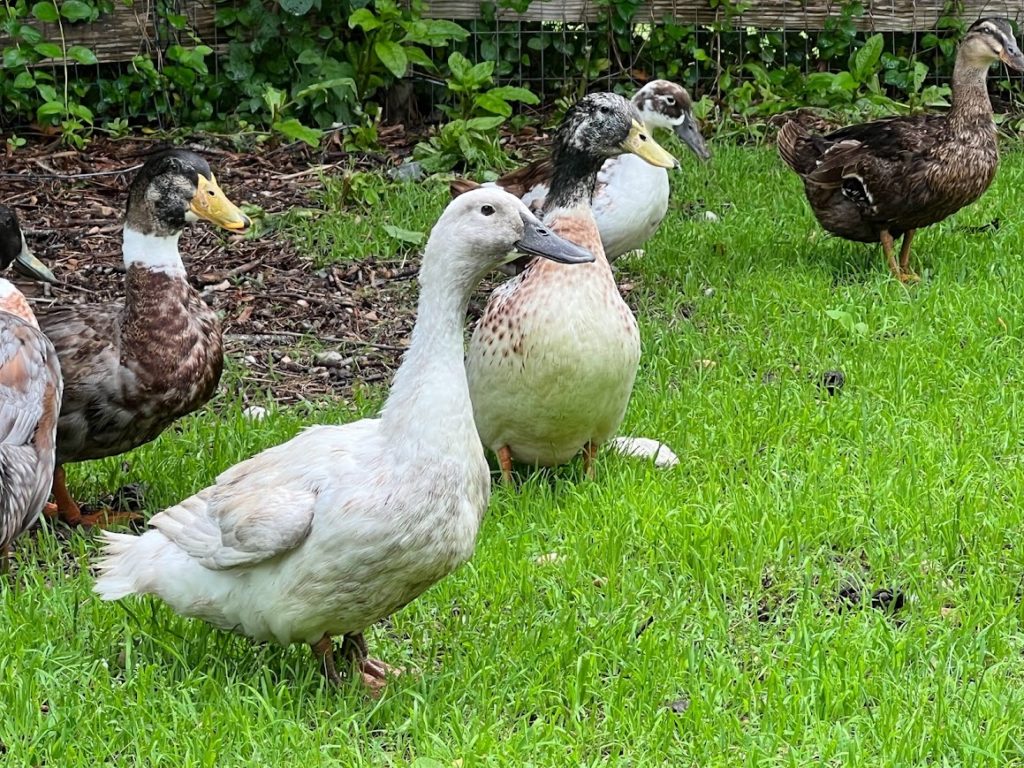
Buried wire
Ducks are not going to dig underneath a fence to escape, but a predator will certainly dig in. If you free range your flock, ideally you should bury hardware cloth wire 1.5 feet down into the ground from the bottom of the fence around the entire perimeter. If you have a very large yard this could be cost prohibitive. At the very least you should have buried wire around their duck coop & run and block any large gaps in your perimeter fence.
Secure coop
The most important thing you can do to keep your ducks safe is to have a secure coop that you lock them into each night. Nighttime has the highest predator risk and ducks don’t see very well in the dark so they must be secured indoors.
A duck coop doesn’t have to be anything fancy. They prefer to sleep on the ground. You can scatter straw on the floor for them to build nests with. Plan for about 4 square feet of floor space per duck. Draft free ventilation is important in a duck coop. To keep your duck coop predator proof, vents should be covered with hardware cloth. If you live where there are large predators (like bears) be sure the coop is heavy enough or anchored so it can’t be tipped over.
If ducks had a choice, they would sleep outside. They don’t tend to go indoors on their own like chickens but it is important to usher them inside each night. They adapt to the routine well. We simply go outside at dusk, stretch out our arms, and walk behind them. They know it’s time to go to bed and will waddle into the coop. Before we usher the birds into the coop we always shine a flashlight in there to make sure no one is hiding in the coop. One time we found a skunk hiding in a nest box! We were really glad he didn’t get closed up with our birds all night!
Be sure your coop door has a sturdy latch to keep your birds safe. Raccoons have nimble fingers that can figure out simple latches. A spring-loaded eye hook or other two step latch will work to keep raccoons out.
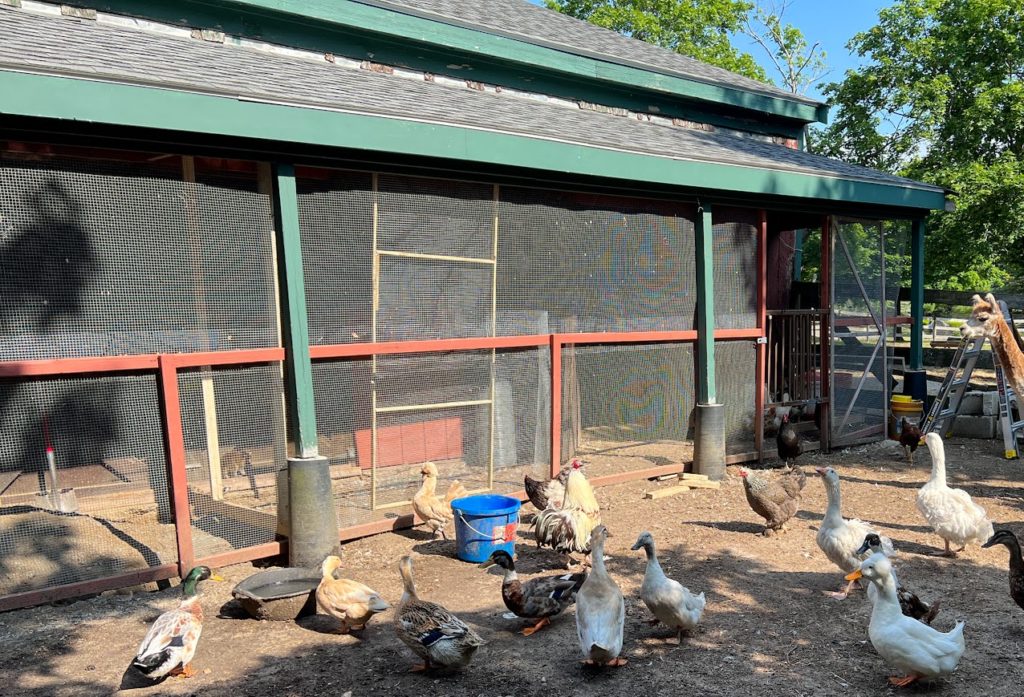
Avoid dusk & dawn
Whenever possible, keep your ducks locked in their coop during dusk & dawn as well as overnight. Many predators are active during these hours. I recommend locking up your birds at least half an hour before sunset and keeping them locked up until at least half an hour past sunrise.
Don’t leave food & water out overnight
When you go outside at night to lock the birds in their coop you should dump the feed & water. We dump the water bowl and leave it upside down. Then we pour any uneaten feed back into the feed bag which is kept in a metal can. You don’t want anything around to attract hungry predators who might stay around for a duck entree. Water is particularly attractive in the hot summer and also in the winter when unfrozen water is hard to come by. I don’t recommend keeping the feed & water inside the coop because ducks make such a mess with both.
Provide cover in the yard
Wide open spaces can be dangerous for free ranging ducks. Planting trees, bushes, or tall grasses can provide natural cover, especially from flying predators like hawks. Just be sure whatever you are planting is not toxic to your ducks. Here is a handy article on toxic plants. If you can’t plant trees or bushes, consider adding other “obstacles” your ducks could take cover under like tables or chairs.
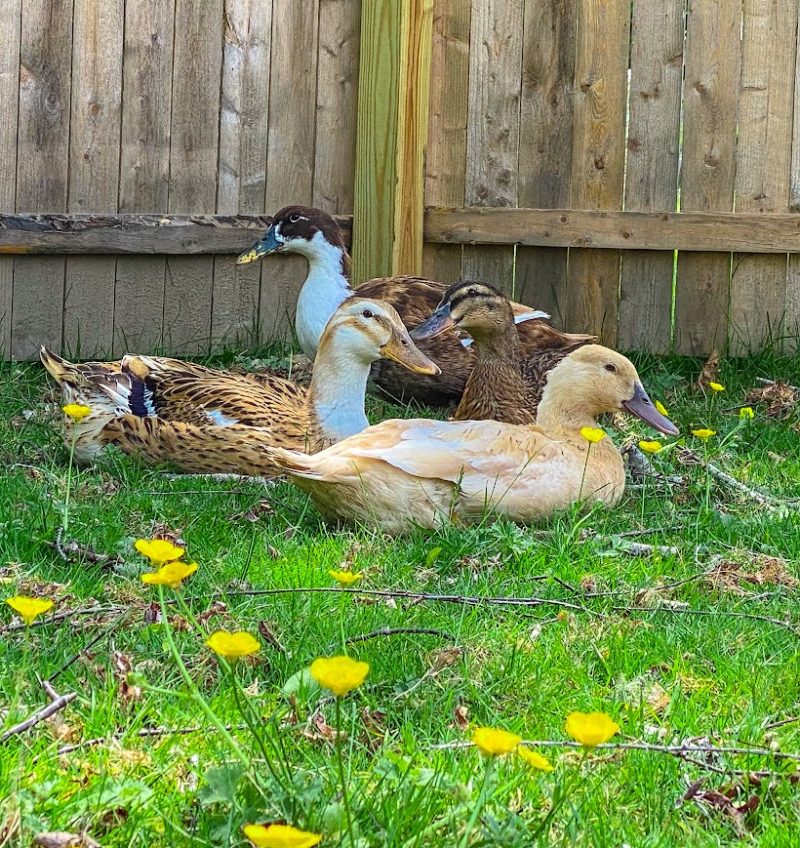
Add some larger animals to your farm
You were looking for an excuse to expand right? At the very least you should have multiple ducks. In a flock, one can be the lookout while others are sleeping or foraging. Our ducks free range with our chickens, geese, goats, and alpacas. The presence of the larger animals has dramatically reduced any predator activity for us. Roosters are great about warning everyone when a hawk is flying overhead so they can run for cover. Our geese & ducks love to hang out together and the geese aren’t letting anything unauthorized in the area.
Larger animals like livestock dogs, goats, sheep, donkeys, alpacas, horses, and cows are all great for making a predator think twice about coming after your ducks. We caught a hilarious video on our paddock security camera of one of our alpacas making a warning call (a sort of strange donkey like noise they make when they see danger). I don’t know what he saw but every duck in the paddock immediately waddled to the coop with the alpaca standing guard. He even followed them to the coop door to make sure they got home safe.
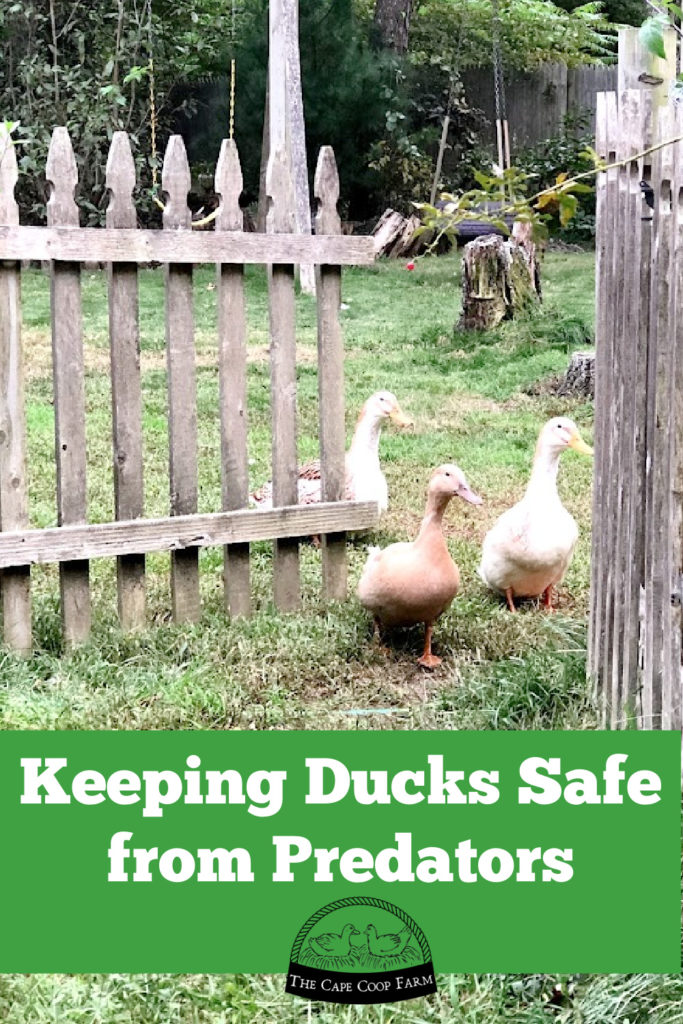
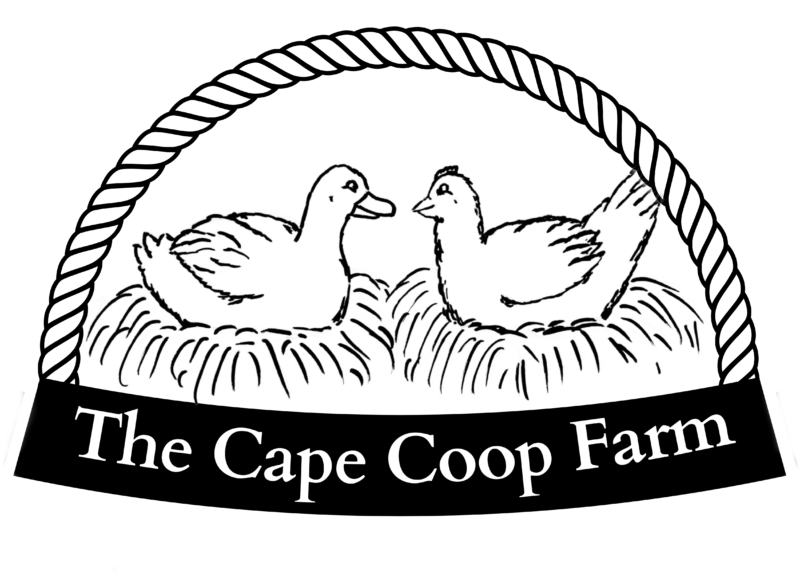
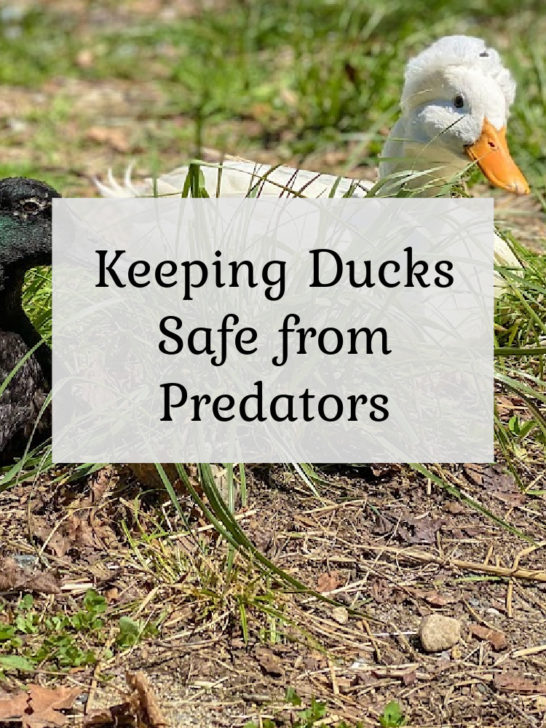

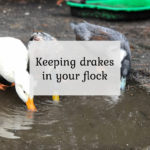
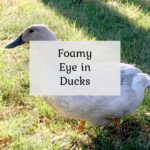
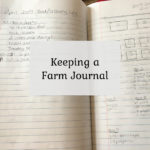
Paul
Sunday 21st of January 2024
Excellent article/advice… Thank you!
There is absolutely no excuse for not having a rock solid (tall) perimeter fence around the areas of your home and for smaller livestock. My perimeter fence is 10 feet, and yes, I had to get special permission to build it that high, but it was easy to sell them on the idea that keeping predators out means that I will never have to kill them. Yes, it is also more expensive to have a tall perimeter fence, but it is also cost effective to not lose livestock to predators and disease (I have 8” of gravel at least 3’ from each side of the fence… So it is weed free, also free of cover/hiding places, and discourages digging). I also have areas of sky fencing/netting within that perimeter, and in the open areas I fly bird tinsel on tall wood poles and tree limbs.
I have lost zero livestock to predators or disease. In my area, I have bears, fox, coyotes, skunks, raccoons, opossums, snakes, eagles, hawks, vultures, stray dogs, mountain lions, bob cats, feral domestic cats, and ticks). None of those can get through my perimeter fence. The deer can’t get over my perimeter fence either (so they can’t bring ticks with them). The fence is both woven wire and hardware cloth at the outside bottom… So mice and snakes can’t get through it.
The bottom line is this… The only way you can keep your livestock safe is to fence out the bad and fence in the good. I only use mobile electric wire / electric fence net on the interior of that perimeter (22 acres). (With the exception of the garden/crop area, which is T posts with wire fence, (so it is a pain to move, but still fairly easy. And only needs to be 4’ to 5’ tall). The perimeter fence is for protection and safety, the interior fence within is just for managing livestock, it is mobile and inexpensive. A single mobile woven hot wire is all that I need for the majority of it (including pigs).
It’s a little more expensive, but the perimeter fence is what keeps the good in, and the bad out. Don’t feed wild animals, especially don’t feed them the livestock that you steward. If you can’t protect them, then you have no business trying to raise them. I can walk out my door, any time of day or night, knowing that there will never be a wild animal there. That peace of mind for my livestock, as well as small children, is priceless. Build a rock solid perimeter fence, and you will never have to worry.
For larger animals like cattle, that perimeter fence is nice, but not as necessary. A guard dog is sometimes a better solution (but if you can, do the perimeter fence)… Birds, rabbits, and sometimes pigs and sheep, I prefer to protect them from anything as small as a tick, to anything as big as a bear. Ticks, especially those hitching rides on deer, are a massive threat that most don’t know to think about. Keep the large predators out, but also keep the tiny ones out, the ones that bring diseases with them. We will never be able to fence out mosquitoes, but we can encourage dragon flies and bats.
Wild animals only cause problems on farms/homesteads, if you don’t fence them out, you will have to suffer those problems, big and small. Having a duck pond is great, but put netting over it or you will be inviting diseases from other areas to infect the birds you are raising. Don’t feed aerial predators, use a variety of deterrents to motivate them to hunt elsewhere. If you never lose an animal to predators or disease, you are doing it right. Anything else is wrong at some level. Our biggest asset is our brain, use it, and life is so much better / easier… Don’t use it and you will be a struggling, miserable, anti-vax, flat earther, dead livestock, Trump loving moron… I don’t know why anyone would choose that tho, it seems a bit more involuntary.
Debbie
Saturday 20th of January 2024
Love my ducks. I let all the ducks and chickens out of the pen in the morning. The ducks run for the pond. So cute. It's a big pond. They stay there most of the day. When it's time to go to the pen, I call them out of the pond with the quack quack song. I walk toward the pen singing the song and they all follow single file behind me. I'm sure my neighbors think I'm insane. Who said ducks aren't smart and don't know their names? Mine all do. I do have dogs out in the yard, which helps with any predators. My lab will swim in the pond with them when she's hot. My bird dogs don't know they're bird dogs. My Pointer herds the chickens into the pen every night. She also finds them when they hide.